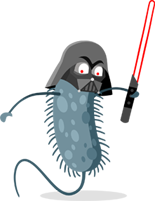Hygiene - the last microbe
Hygiene habits are acquired at an early age and are extremely important to protect ourselves from various diseases caused by poor hygiene habits.



There are good and bad microorganisms in our body, and we declare war only to the bad ones!
Specifically, it is not the goal to completely destroy the microorganisms on our body, as we need most of them to survive and function normally. Personal hygiene as well as hygiene when handling food is important for maintaining a healthy life.
To prevent contagious diseases, it is extremely important to follow personal hygiene rules such as hand washing before and after eating (hand hygiene during all food handling is very important because of the risk of transmitting potentially pathogenic microorganisms), after using the toilet, changing dirty clothes, after sneezing, coughing, etc.
Dangerous microorganisms cannot survive long on a dry and clean surface because the dry and clean surface does not contain the nutrients and moisture percentage required for the growth of pathogenic microorganisms.

The human body is home to approximately one thousand species of bacteria and contains more microbes than the United States population.
Every time you sneeze, millions of microorganisms fly out of your body at a speed of 80 km/h!


Also, washing your hands before and during the preparation of food is extremely important.
Although most microorganisms that are found in the kitchen are not dangerous, some are widespread in water, soil, on animals and humans and can be found on hands, dishtowels and kitchen utensils.
It is also very important to separate the raw from the cooked food as raw food such as meat, poultry and seafood contains dangerous microorganisms (there are a large number of microorganisms on thermally unprocessed food) that can be transferred to other foods during preparation and storage.
It is important that we respect the expiry date of the food and that we thermally treat the food completely, as this can destroy the microorganisms on it. We must wash thoroughly all fruits and vegetables that we plan to eat raw with healthy, clean water.

We should wash our hands thoroughly for 20 seconds.


Your food fell on the floor – What are you going to do now?
It has happened to all of us at least once that the food we were about to eat fell on the floor. The question we asked ourselves at that moment was: “Will I eat food I lifted from the floor or is it no longer healthy?” We can find the answer to that question in a so-called 5-SECOND RULE.
Scientists have proven that the likelihood of contamination is very low if we lift the food from the floor within 5 seconds, but not exclusively. In most cases, in such a short period, the microorganisms that have passed on the food will not cause more serious infections, but this, of course depends on the type and humidity of the medium and the microbial population there.
We conclude that nothing will happen to you if you pick up your food quickly, but keep in mind that it's better to prevent it than to cure it.







